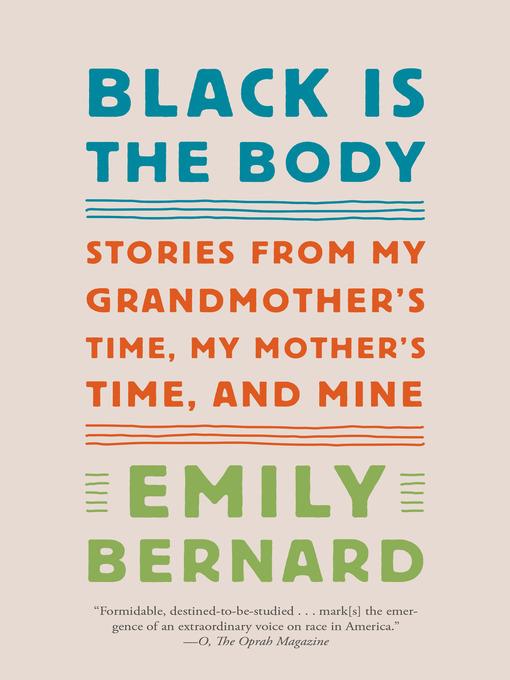
Black Is the Body
Stories from My Grandmother's Time, My Mother's Time, and Mine
- اطلاعات
- نقد و بررسی
- دیدگاه کاربران
نقد و بررسی

November 15, 2018
A memoir in essays about race that is as lucid as the issue is complicated.Though Bernard (English and Critical Race and Ethnic Studies/Univ. of Vermont; Carl Van Vechten and the Harlem Renaissance: A Portrait in Black and White, 2012, etc.) is a scholar, her latest book is almost devoid of jargon. Instead, the writing is deeply felt, unflinchingly honest, and openly questioning. The author makes no claims to have all the answers about what it means to be a black woman from the South who has long lived and worked in the very white state of Vermont, where she might be the first black person that some of her students have encountered. From the evidence on display here, Bernard is a top-notch teacher who explores territory that many of her students might prefer to leave unexplored. She is married to a white professor of African-American Studies, and she ponders how his relationship with the students might be different than hers, how he is comfortable letting them call him by his first name while she ponders whether to adopt a more formal address. The couple also adopted twin daughters from Ethiopia, which gives all of them different perspectives on the African-American hyphenate. But it also illuminates a legacy of storytelling, from her mother and the Nashville where the author was raised and her grandparents' Mississippi. "I could not leave the South behind. I still can't," she writes, and then elaborates on the relationship between blacks and whites there: "We were ensnared in the same historical drama. I was forged--mind and body--in the unending conversation between southern blacks and whites. I don't hate the South. To despise it would be to despise myself." The book's genesis and opening is her life-threatening stabbing by a deranged white stranger, a seemingly random crime. Toward the end of the book, she realizes that "in every scar there is a story. The salve is the telling itself."A rare book of healing on multiple levels.
COPYRIGHT(2018) Kirkus Reviews, ALL RIGHTS RESERVED.

December 1, 2018
"Blackness is an art, not a science," writes Bernard (English, critical race & ethnic studies, Univ. of Vermont; editor, Remember Me to Harlem: The Letters of Langston Hughes and Carl Van Vechten). Blackness is a situation, a story, a condition full of contradictions, and the thread that runs through the essays in this collection. The author is interested in the border where blackness meets whiteness and the line between self and other. She writes of being stabbed in the stomach during grad school, her interracial marriage, going home to Mississippi, hair, white friends, adopting twin girls from Ethiopia, and what it's like to be black in one of the whitest states in the country. In the most powerful piece, "Teaching the N-Word," Bernard prods her African American studies class of all white students into a frank discussion. By telling these stories, she hopes to contribute to the conversation of race in America, a narrative that defies conventions and popular assumptions. VERDICT Bernard's honesty and vulnerability reveal a strong voice with no sugarcoating, sharing her struggle, ambivalence, hopes, and fears as an individual within a web of relationships black and white. Highly recommended. [See Prepub Alert, 8/20/18.]--Stefanie Hollmichel, Univ. of St. Thomas Law Lib., Minneapolis
Copyright 2018 Library Journal, LLC Used with permission.




دیدگاه کاربران